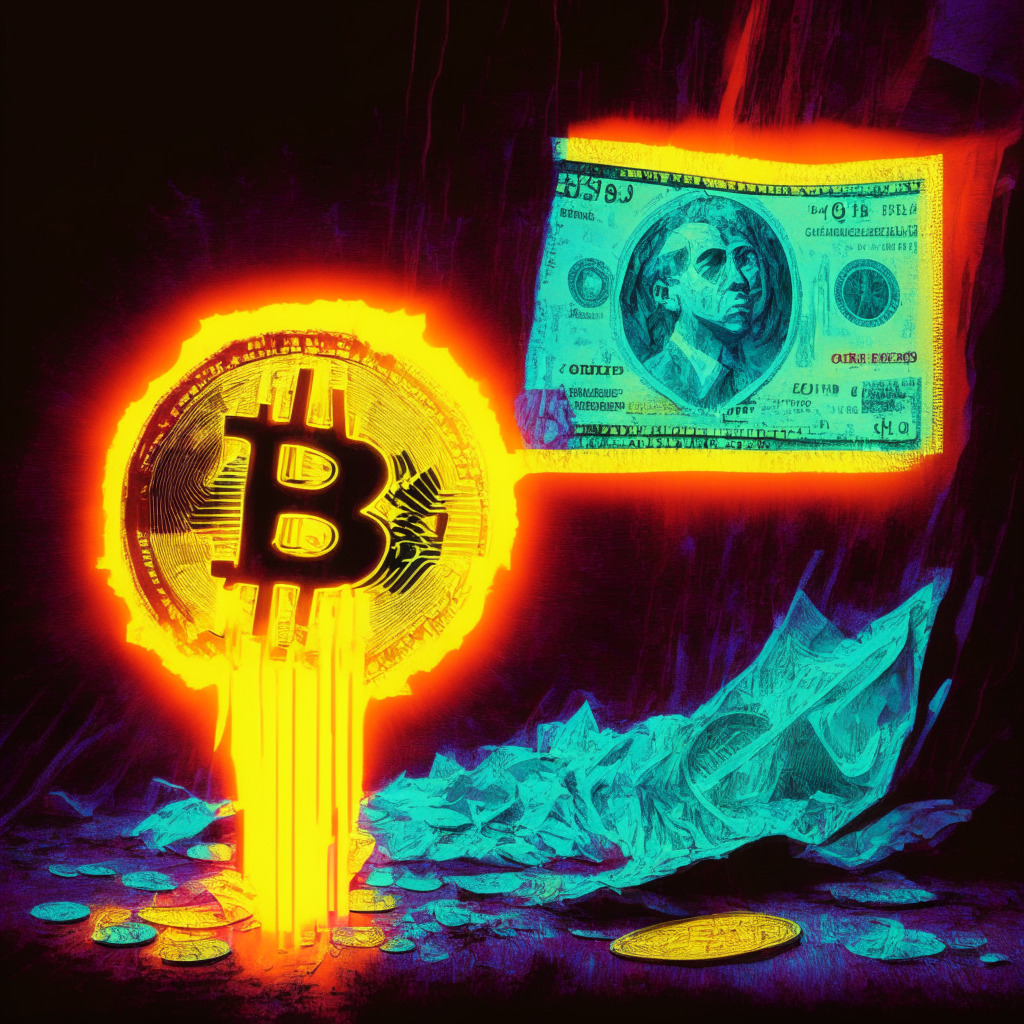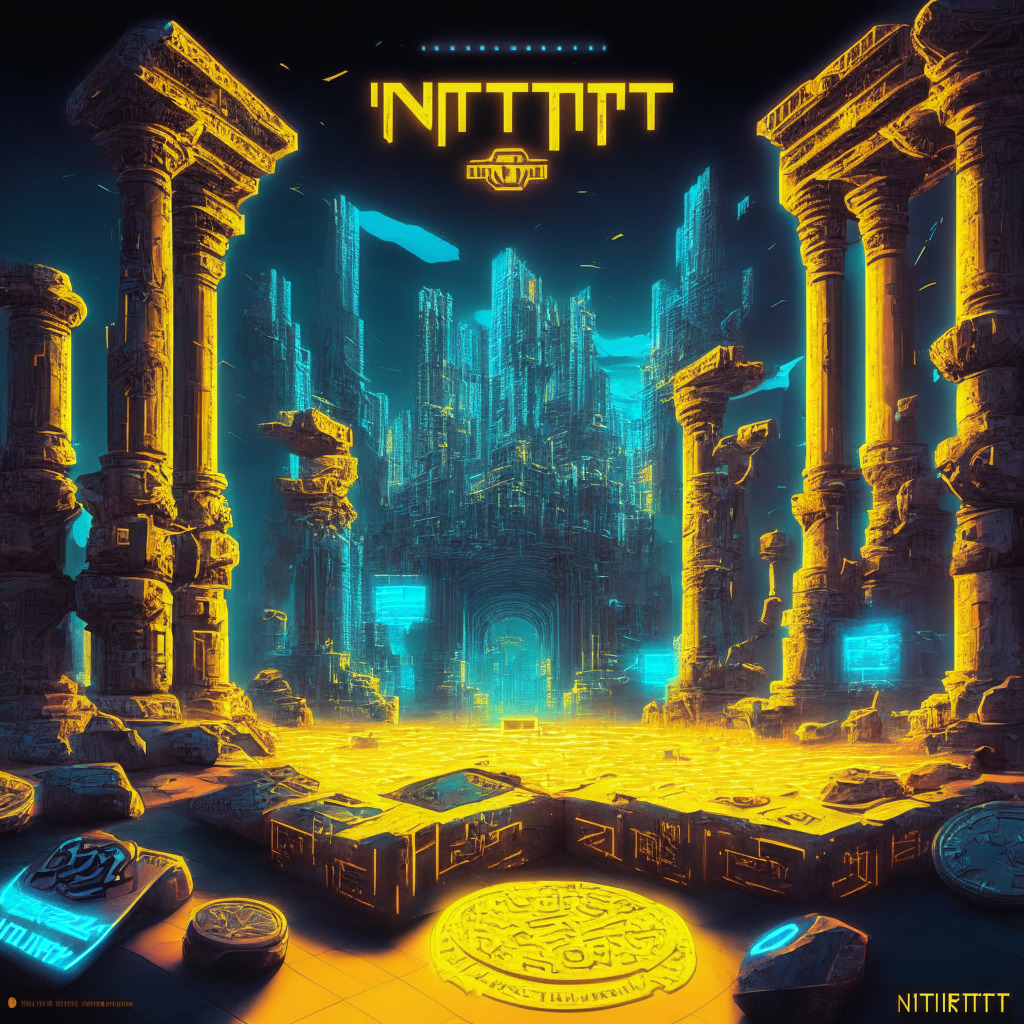“PayPal’s landmark launch of PYUSD marks a shift in crypto space, indicating global integration of blockchain technology. PYUSD allows individuals to transfer funds globally, enabling broader adoption of blockchain for safer, quicker, affordable transactions. Despite initial apprehensions, PayPal’s venture may catalyze unprecedented change in existing financial systems.”
Search Results for: maga
PayPal’s Plan for Issuing Stablecoin: A Bold Gamble or an Interest Earning Strategy?
PayPal plans to issue a U.S. dollar stablecoin, PYUSD, on the Ethereum network. Expected to enhance PayPal’s revenue stream, PYUSD’s underpinning structure includes earning interest on financial holdings. Through PYUSD, PayPal’s user balances can accrue interest, especially if interest rates increase, extending a revenue opportunity for the company.
Decoding the Bart Simpson Pattern: A Breakdown of Bitcoin’s Cyclical Market Trends
“Bitcoin’s price has been range-bound, signifying a ‘Bart Simpson pattern’ indicating a cyclical bearish-bullish trend. While the ‘buy and hodl’ strategy is often advised, market forces and historical patterns play significant roles in Bitcoin’s price movements, and its future trajectory remains uncertain.”
Cryptocurrency Beyond Wealth: Exploring Real-World Uses of Crypto Tech
“Crypto’s primary use is still to amplify wealth, but its potential extends well beyond that. Blockchain technology can revolutionize self-custody of assets, enable peer-to-peer connections, and spur innovative business models. Overcoming rampant speculation to highlight crypto’s actual utility is crucial.”
The Unsettling Reality of Crypto Hacks: Unraveling the CoinsPaid Heist
“The Ukrainian firm CoinsPaid fell victim to a cyber heist that resulted in an estimated loss of $37.3 million in crypto assets. The attack was reportedly orchestrated via social engineering attempts using LinkedIn and involved malicious usage of software called JumpCloud. It’s believed that this crime mirrors the tactics of the North Korean Lazarus Group, highlighting the evolving complexity of cybercrime in the digital marketplace.”
PayPal’s Entry Into Crypto: A Boon to the Industry or Threat to Web3’s Future?
“PayPal’s announcement of a stablecoin on Ethereum, followed by imposter tokens looking to cash in on its success, indicates possible future rug pulls. PayPal’s decision to operate within the established financial system counters crypto’s aim to break from traditional financial structures. It boosts crypto’s credibility, yet risks changing Web3’s face.”
Harnessing Green Solutions: How Bitcoin Mining Could Drive Us Towards A Carbon-Neutral Future
“Bitcoin mining’s energy consumption has raised environmental concerns. However, recent innovations like flare gas solutions and nuclear energy are promising enhancements. Harnessing flare gas, an underused resource, for mining operations could drive a carbon-neutral era. Further potential lies in microgrids and nuclear power, despite safety and regulatory concerns. All these seek to incentivize blockchain use beyond Bitcoin mining, significantly reducing the industry’s carbon footprint.”
Brazil’s CBDC ‘Drex’: Triumph in Banking or Gateway to Central Authority Meddling?
“Brazil’s Central Bank recently introduced its central bank digital currency, Drex. However, concerns are raised by the currency’s potential for central authority interference, alongside questions about the movement of assets of popular cryptos following the collapse of Silvergate Bank. Advocates, meanwhile, hail the currency’s potential to improve Brazil’s banking sector.”
The Crushing Uncertainty: Crypto’s Struggle with Regulators and the Future of Digital Assets
“A significant episode in China underlined the persistent uncertainty around cryptocurrency’s legal status. A man lending Bitcoin faced an unsympathetic legal system when the borrower defaulted. The court ruled Bitcoin, as a digital commodity, doesn’t hold the same legal status as fiat currencies, therefore, can’t be subject to legal enforcement or compensation.”
Deciphering Market Signals: Bitcoin Shorting Subsidizes Amidst Potential Surprise Volatility Surge
The shorting of Bitcoin seems to be decreasing, with the destructive influence of the past three months starting to wane. However, the exit from Bitcoin-related funds and intense regulatory scrutiny have created notable market challenges. Yet, analysts highlight potential imminent volatility, suggesting an eruption in the Bitcoin marketplace may be near.
El Salvador’s Bitcoin Experiment: Reflecting on the Dawn of a Blockchain Era
“El Salvador, the first nation to adopt Bitcoin as a national currency, faces challenges convincing average Salvadorans of its value. Despite Bitcoin’s potential as an inflation-proof, decentralized alternative to the U.S. dollar, understanding and acceptance of this digital commodity remain unclear among natives. The country’s Bitcoin adoption story is still unfolding.”
The LIBOR Lessons: What Cryptocurrency Can Learn from Past Financial Scandals
The transition from LIBOR to the Second Overnight Financing Rate highlights issues similar to those facing the crypto industry, including misconduct, corruption, and slow regulatory response. This shift has implications for crypto, like LIBOR, it enjoys minimal oversight over major players. With crypto’s rise as a top-performing asset, questions surface: Will crypto follow LIBOR’s path? Can the financial system include crypto in future reforms?
Exploring the Impacts of PayPal’s Stablecoin PYUSD: Vehicle for Financial Inclusion or Corporate Gain?
“PayPal’s U.S. stablecoin, PYUSD, has sparked interest in the crypto world. Unlike smaller cryptofirms, traditional giants like PayPal can influence regulators to accommodate their aspirations. However, whether PYUSD will democratize access or predominantly serve business interests remains uncertain.”
The SEC’s Covert Crusade Against US Crypto: Potential Collapse or Global Shift?
The U.S. Securities and Exchange Commission’s (SEC) changes in regulatory policies could be sabotaging the resurgence of the blockchain industry. The new rules, perceived by some as covert attempts to regulate crypto out of existence, have led to startups moving offshore and riskier investments for U.S. investors. The shift towards a more merit-based regulatory role by the SEC threatens to restrict financial open-source software and could disqualify operators like Fidelity Digital Assets from acting as custodians.
Centralization vs Decentralization: The Battle for our Digital Existence
“In an era where digital advancement accelerates, centralized platforms like Twitter, now “X”, threaten user safety, privacy, and control. They replicate China’s WeChat convenience, but also its control over autonomy and data. However, blockchain and cryptography offer routes towards decentralized, user-controlled digital existence.”
Speculating Bitcoin’s Future: Profiting Amid Low Volatility against Incoming Explosions
“Bitcoin volatility metrics are at record lows, anticipating a possible return to normalcy. While some market participants anticipate sudden price turbulence, others are planning strategies that bet against price volatility. Yet, shorting volatility or selling options can result in significant losses if the market abruptly shifts.”
Crypto Market Crossroads: DeFi Security Woes, Regulatory Uncertainty, and Ethereum’s Monumental Growth
“Recent DeFi security incident, leading to $61 million theft, raises questions about security robustness in this sector. HashKey and OSL’s milestones signify Hong Kong’s evolving crypto scene. As US DoJ weighs charges against Binance, CoinBase counters delisting reports, while Ethereum celebrates its 8th birthday amid tumultuous times in crypto market.”
Decentralized Finance: Far from Dead or a Doomed Experiment?
“Despite setbacks and criticisms, such as the recent Curve Finance controversy, the DeFi sector is far from ‘dead.’ It’s actually seeing significant interest from corporate stalwarts like Mastercard, Visa, and BlackRock, all harnessing its efficiency-enhancing capabilities. Decentralized finance technology promises transparency, efficiency, disintermediation, and self-custody, indicating the sector’s potential for long-term growth.”
Downplayed US Credit Rating: Cryptocurrency as a Potential Game-Changer in the Dollar-Dominated Debt Market
“This article discusses the potential disruption Bitcoin and cryptocurrencies could pose to traditional money systems; highlighting the influence of Bitcoin in strengthening citizens’ financial rights. Simultaneously, the rising popularity of central bank digital currencies (CBDCs) could trigger a massive financial transformation, pressuring the US to embrace these emerging monetary systems.”
Unraveling the Bitfinex Bitcoin Heist: A Tale of Missteps, Mystery, and Muddled Confessions
Recently, Ilya Lichtenstein admitted to the infamous heist of 112,000 bitcoins from Bitfinex in 2016. Yet, the specifics surrounding the confession and subsequent accusations of money laundering are unclear, leading to doubts about Lichtenstein and his spouse’s involvement in the theft and their subsequently unconventional behavior.
In Search of Originality: The Unconventional Approach of Lea Thompson in Crypto Communication
Lea Thompson, known as Girl Gone Crypto, disapproves the repetitive “breaking” news tweets on crypto, opting for engaging commentary and humor. Her unique approach, offering her followers refreshingly unconventional content, has largely contributed to her growing popularity within the crypto community.
Radicals in Blockchain: Reimagining The Commons with Cryptocurrency
“Dávila recently authored ‘Blockchain Radicals: How Capitalism Ruined Crypto and How to Fix It,’ a book that explores blockchain’s role in organizing non-state social and economic alliances. He upholds crypto’s potential to redefine and rejuvenate ‘the commons’ and advocates for broader understanding of the endless possibilities that crypto offers.”
Tether’s Billion-Dollar Quarterly Profits: Financial Health or Cause for Concern?
“Tether’s self-reported asset value of over $86 billion surpasses the market cap of its USDT stablecoin. While the brand boasts a $1 billion profit, skepticism arose from its financial history and reduced cash holdings, opening conversations about the need for a full-fledged audit.”
Metaverse Losses and Blockchain Gaming: Navigating the Unchartered Waters of Cryptocurrency Integration
“Facebook’s Meta invests heavily in the metaverse despite losses, while in the blockchain gaming space, Alchemy: Battle for Ankhos integrates cryptocurrencies and AI. Meanwhile, Ultra, a crypto gaming startup, builds a tournament platform with its blockchain network for the thriving eSports industry.”
Stablecoins: A Counterbalance Against De-dollarization and Boost for US Global Standing
“U.S. regulated fiat-backed stablecoins could counterbalance the weakening dominance of the dollar due to de-dollarization efforts by BRICS and emerging markets. Pegged to the U.S. dollar, these digital tokens merge traditional currency stability with cryptocurrencies’ technological strength.”
Navigating the Future of Blockchain Wallets: Simplicity and Security in a Post-Wallet Web3 World
“Blockchain wallets’ complexity and high stakes of faults are impediments to widespread adoption. Innovations aim to make wallets as user-friendly as Web2 apps, while remaining decentralized and secure. Technologies like smart contract wallets and Decentralized identifiers (DIDs) promises improved functionality, security and simplified interactions for users, envisioning a wallet-less Web3 experience.”
Dealing with Economic Descent: Lessons from Crypto’s Collapse and Potential for Revival
“Crypto’s potential to facilitate democratic, innovative online governance clashes with reality of insiders controlling power. Post-Terra-Luna collapse, Ethereum co-creator, Vitalik Buterin, proposed deposit insurances for protocols to gain user faith, yet transparency demands often go unmet. Ultimately, crypto’s potential remains boundless, yet trusting implementation is crucial.”
Navigating the Tempest: The SEC, Richard Heart, and Allegations of Crypto Deception
The U.S. Securities and Exchange Commission (SEC) is pressing charges against Richard Heart, the backer of projects Hex, PulseChain and PulseX, accusing him of fraudulent practices. Heart allegedly recycled investment funds during Hex’s inception phase, effectively inflating initial investment, attracting more victims, and misleading investors with a fictitious “staking” program. This serves as a warning to evaluate the underlying technology and financial models of investment targets.
Barbie and Bitcoin: A Tale of Independence and Financial Feminism
“Analyzing Barbie’s entrepreneurial progress, one finds that she mirrors an important facet of Bitcoin—financial autonomy. Barbie and Bitcoin both question norms and disrupt boundaries. While Barbie disrupted gender stereotypes, Bitcoin can help women shake the male-dominated financial landscape.”
Under the Hood of Crypto Exchanges: Balancing Risks and Rewards in the Digital Frontier
“Cryptocurrency exchanges can drastically affect user assets, often misused in ways that do not align with user expectations. Simon Dixon, CEO of BnkToTheFuture, highlights the lack of industry guidelines, enabling businesses to manipulate customer funds. This raises concerns about platform responsibility and trustworthiness.”
Navigating MiCA: Ukraine’s Struggle with new EU Crypto Regulation Measures
As Ukraine nears EU membership, it faces a critical shift with the impending Markets in Crypto-Assets Regulation (MiCA). The law’s stringent requirements for crypto service providers might reduce the attraction of Ukraine’s jurisdiction. Moreover, compliance challenges could discourage new entrants, potential legal risks, and steep issuance costs, affecting crypto exchange services. The regulation also overlooks certain crypto assets, leaving a potential legislative gap. However, feasible adaptation of MiCA could help Ukraine influence European crypto policy upon getting full EU membership.
The Rise and Crisis of DeFi: A Close Brush with Disaster and Its Implications
“The DeFi community recently faced a potential crisis when Curve Finance’s founder risked significant funds on his platform’s tokens. This precarious scenario could have toppled the entire DeFi sector. The incident has sparked questions about the system’s integrity, transparency, and overall stability, reminding us of the inherent risks of the rapidly evolving DeFi world.”































